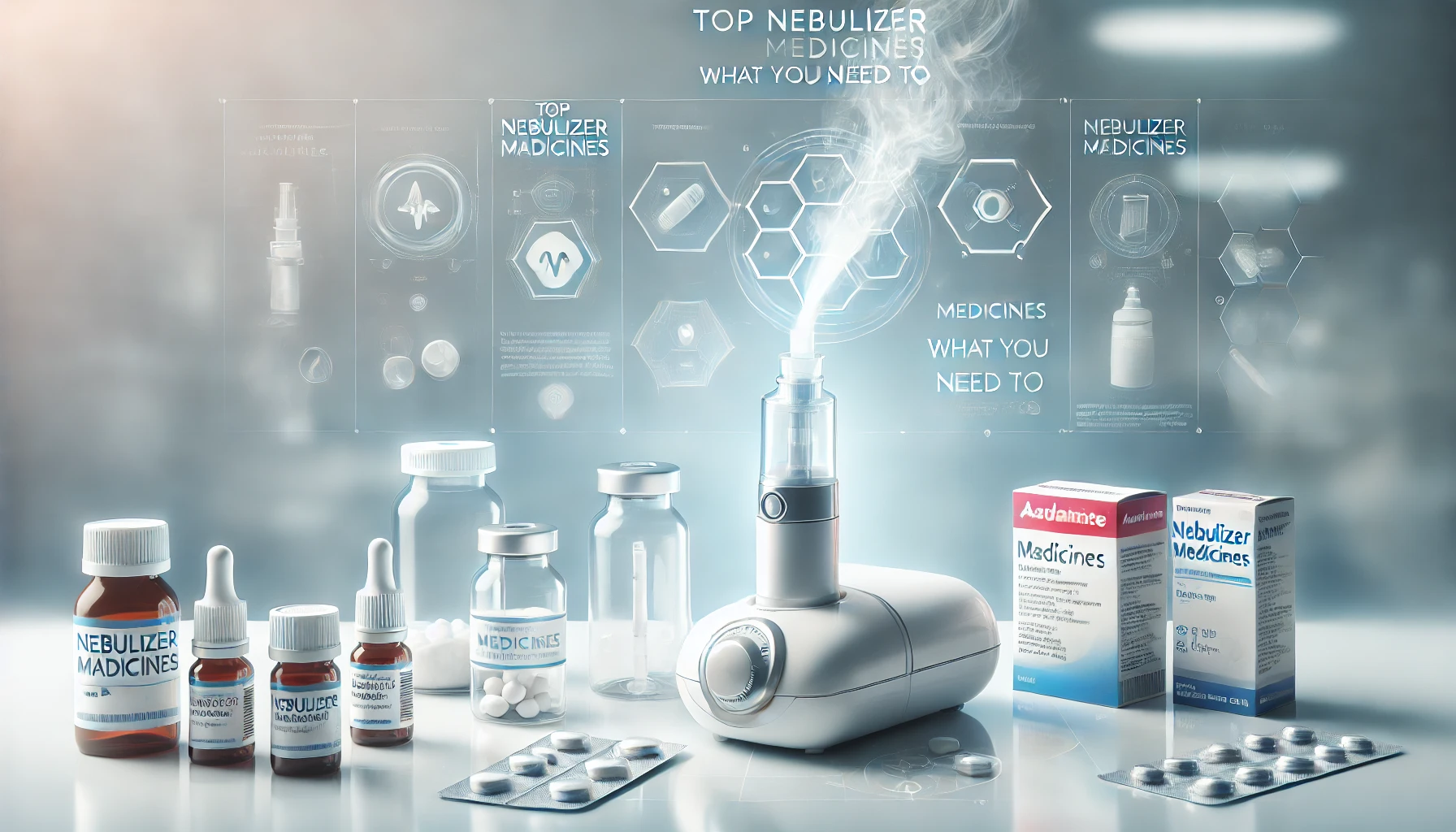Table of Contents
- Introduction
- What is a Nebulizer?
- Importance of Nebulizer Medicines
- Common Respiratory Conditions Treated
- Top Nebulizer Medicines in Pakistan
- Availability of Nebulizer Medicines in Pakistan
- How to Use Nebulizer Medicines Safely
- Side Effects and Precautions
- Comparison of Local and Imported Medicines
- Tips for Maintaining Your Nebulizer
- Future of Nebulizer Medicines in Pakistan
- Conclusion
- FAQs
Introduction
Breathing is life, and for those battling respiratory illnesses, nebulizers are a lifeline. In Pakistan, where respiratory conditions like asthma and COPD are prevalent, nebulizer medicine plays a critical role in providing quick and effective relief. Whether you’re a patient or a caregiver, understanding nebulizer medicines is essential for managing these conditions effectively.
What is a Nebulizer?
A nebulizer is a medical device that converts liquid medicine into a fine mist, making it easier to inhale directly into the lungs. It is particularly beneficial for individuals who struggle with traditional inhalers or need higher doses of medication. In Pakistan, both portable and tabletop nebulizers are widely available, catering to various needs.
Importance of Nebulizer Medicines
Nebulizer medicines are designed to target the lungs directly, ensuring faster relief compared to oral or injectable treatments. They are especially useful in acute conditions where immediate action is required, such as severe asthma attacks or sudden bronchial spasms.
Common Respiratory Conditions Treated
Asthma
Asthma patients often rely on nebulizers for quick relief during an attack or to manage chronic symptoms.
Chronic Obstructive Pulmonary Disease (COPD)
COPD sufferers benefit from nebulizers to improve airflow and reduce inflammation in the airways.
Bronchitis
For those with acute or chronic bronchitis, nebulizer medicines help loosen mucus and reduce coughing.
Pneumonia
In severe cases, nebulizers can deliver antibiotics or other treatments directly to the lungs.
Top Nebulizer Medicines in Pakistan
Bronchodilators
Bronchodilators like Salbutamol and Ipratropium Bromide are widely used to relax the muscles around the airways, making breathing easier. These medicines are staples for asthma and COPD patients.
Corticosteroids
Budesonide and Fluticasone are common corticosteroids used in nebulizers. They reduce inflammation and prevent airway swelling, offering long-term control of respiratory conditions.
Antibiotic Solutions
Tobramycin is a popular antibiotic nebulizer medicine for treating bacterial lung infections, especially in conditions like cystic fibrosis.
Hypertonic Saline Solutions
These solutions help thin mucus, making it easier to expel. They are commonly recommended for patients with chronic bronchitis or cystic fibrosis.
Popular Nebulizer Medicines
- Ventolin Nebulizer: A widely used bronchodilator containing Salbutamol, providing quick relief from asthma symptoms and bronchial spasms. Ventolin is particularly effective in managing acute respiratory conditions.
- Atem Nebulizer: Contains Ipratropium Bromide, ideal for COPD patients. It helps in relaxing the airway muscles, improving airflow and reducing breathing difficulties.
- Clenil Nebulizer: A corticosteroid option often used to control and prevent long-term respiratory conditions. Clenil nebulizer for infants is a trusted choice for managing asthma and other inflammation-driven conditions in children.
Availability of Nebulizer Medicines in Pakistan
In Pakistan, nebulizer medicines are readily available at pharmacies and online stores. Popular brands include GlaxoSmithKline, Getz Pharma, and local manufacturers offering affordable options. Prices vary depending on the brand and type of medicine. Additionally, nebulizer machine price in Pakistan varies based on features and quality, ensuring an option for every budget.
How to Use Nebulizer Medicines Safely
Always follow your doctor’s instructions regarding dosage and usage frequency. Ensure the nebulizer is clean and properly assembled. Sit upright during nebulization for maximum effectiveness.
Side Effects and Precautions
While nebulizer medicines are generally safe, they can cause side effects like dry mouth, jitteriness, or throat irritation. To minimize risks, stick to prescribed doses and inform your doctor of any adverse reactions.
Comparison of Local and Imported Medicines
Local medicines are more affordable and accessible, while imported ones may offer higher quality or advanced formulations. Consider your budget, availability, and doctor’s recommendations when choosing.
Tips for Maintaining Your Nebulizer
Clean the nebulizer after each use to prevent bacterial buildup. Regularly replace parts like masks and tubing as per the manufacturer’s guidelines.
Future of Nebulizer Medicines in Pakistan
With advancements in medical technology, more efficient and cost-effective nebulizer medicines are expected to enter the market. Innovations like portable nebulizers and improved formulations are set to revolutionize respiratory care.
Conclusion
Nebulizer medicines are a cornerstone of respiratory treatment in Pakistan, offering life-changing relief to countless patients. By understanding your options and using them correctly, you can breathe easier and live better. Always consult your healthcare provider to find the best treatment plan for your condition.
FAQs
Can I use nebulizer medicine without a prescription?
No, it’s essential to use nebulizer medicine only under a doctor’s direction to ensure safe and effective treatment tailored to your condition.
Are nebulizer medicines safe for children?
Yes, nebulizer medicines like Clenil nebulizer for infants are specifically formulated for children. However, always consult a pediatrician before use.
How often should I replace my nebulizer machine?
It depends on the model and frequency of use. Generally, nebulizers last 2–3 years with proper maintenance. Replace parts like tubing and masks regularly for optimal performance.
Can I mix different medicines in a nebulizer?
Only if prescribed by your doctor. Mixing medicines without guidance can lead to adverse effects or reduced efficacy.
What should I do if I miss a nebulizer session?
Take the missed dose as soon as you remember. If it’s close to the next session, skip the missed one and resume your regular schedule. Do not double the dose to make up for a missed session.
